Ross Taylor: Trump pushes Indonesia to China

Last week, while many Australians including some of our most senior political leaders were deeply concerned by the presence of former Victorian premier Daniel Andrews at the massive China Victory Day military parade and the Shanghai Co-Operation Organisation Summit in Beijing, the presence of two regional leaders should have worried us even more.
The first being India’s Prime Minister Narendra Modi — leader of the world’s largest democracy and a fast growing and powerful economy — who is deeply unhappy with US President Donald Trump over his imposition of 50 per cent tariffs on Indian exports, along with Trump’s absurd claim that he solved the recent “war” between India and Pakistan.
Australian policy makers and our PM would have held their heads in despair to watch India pushed by President Trump into the orbit of China, and the image of Modi standing warmly with President Xi made for powerful yet confronting viewing.
If that wasn’t enough worrying news for Australia, which needs India as a core member of the Quad, the diplomatic partnership between Australia, India, Japan and the US focused on maintaining the stability of the Indo Pacific region, the other attendee would have caused even further sleepless nights for our PM.
Indonesia’s President Prabowo Subianto, whose sprawling archipelago of 275 million people has been immersed in violent protests, was there also, standing beside Modi and close to Russia’s Vladimir Putin and North Korea’s Kim Jong Un.
Australia has worked hard to build closer relations with the relatively new Indonesian president and former Suharto strongman, who has steadfastly maintained a non-aligned policy stance for his nation within our region. Yet here he was, desperately wanting to be in Beijing, even as Jakarta burned.
India’s actions were disturbingly clear. But what is happening with Indonesia in its relationship with China? Is our near neighbour — along with numerous other ASEAN countries — being pushed by Trump into much closer ties with China and other BRIC countries, including Russia?
Since becoming Indonesian’s President, Prabowo has made no secret of his desire to see his nation play a far stronger and engaged role in international affairs, particularly within the Indo Pacific region, with Prabowo desperate to reinvent himself from being a discredited army general under the former Indonesian dictator Suharto, to an international statesman happy to walk the international stage.
Early in his presidency, Prabowo conceded ground to China — which is Indonesia’s largest investor and provides almost 90 per cent of capital needed for Indonesia’s minerals expansion, mining and processing — over the disputed Natuna Islands in the South China Sea, while trying to maintain the balance of Indonesia remaining non-aligned in its relationships with both China and the US.
Ironically, Prabowo admires autocratic leaders, including Trump, yet the US President is hurting Indonesia with 20 per cent tariff increases on imports from Indonesia, while “negotiating” a tariff-free status on the importation of US agricultural products into Indonesia; all at a time when last week’s riots were, to a large degree, caused by a deteriorating economy and importantly a flatlining jobs market.
Along with his ASEAN colleagues,
Prabowo does not want his country to drift into a deeper relationship with China, preferring to see an active and engaged US within our region. But Trump has showed contempt for his allies in this region, sending a clear message that American can no longer be trusted as a loyal friend.
This must be deeply worrying for the Albanese Government, as both Indonesia and Australia try to navigate a relationship with Beijing where we are both highly dependent on China for our economic growth, whilst standing our ground by rejecting China’s expansion in our region.
Indonesia faces significant challenges, with its economy faltering as millions of unemployed or drastically under-employed young people realise that Prabowo’s promise of an 8 per cent economic growth rate under his leadership is just a pipe dream. Meanwhile, corruption continues to worry everyday people, and in Jakarta and the regions, Prabowo has built a significant cohort of ex-military officers along with lucrative government positions for political opponents — a move that diminishes Indonesia’s still evolving democracy.
The likelihood of Indonesia returning to the dictatorship days of President Suharto is at present, unlikely but recent events, including Prabowo’s attendance in Beijing, should remind Mr Albanese that we need to do much more work in building even closer ties with our giant neighbour and the other nine ASEAN countries, where we all face a very chaotic and uncertain future.
Ross B. Taylor AM is a member of the advisory board of the UWA’s Public Policy Institute, he is also a former WA Commissioner to Indonesia
Get the latest news from thewest.com.au in your inbox.
Sign up for our emails
